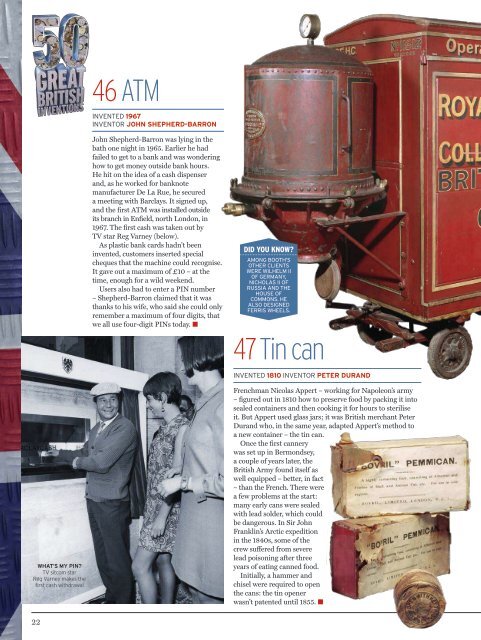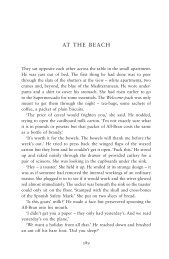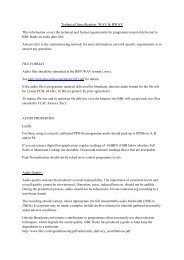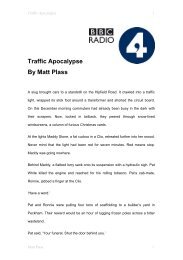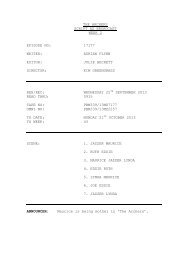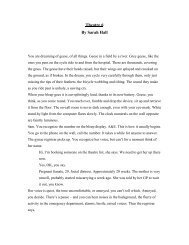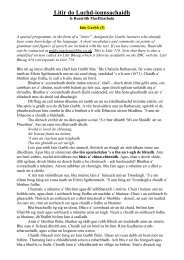50 Great British Inventions - BBC
50 Great British Inventions - BBC
50 Great British Inventions - BBC
You also want an ePaper? Increase the reach of your titles
YUMPU automatically turns print PDFs into web optimized ePapers that Google loves.
picture caption<br />
Od dui tin euismod tio od<br />
elit lum dignit lore ming<br />
eliquam acc ummy<br />
numsan<br />
wHat’s My pin?<br />
TV sitcom star<br />
Reg Varney makes the<br />
first cash withdrawal<br />
46 atm<br />
InVenTed 1967<br />
InVenTOR JoHn sHepHerD-Barron<br />
John Shepherd-Barron was lying in the<br />
bath one night in 1965. Earlier he had<br />
failed to get to a bank and was wondering<br />
how to get money outside bank hours.<br />
He hit on the idea of a cash dispenser<br />
and, as he worked for banknote<br />
manufacturer De La Rue, he secured<br />
a meeting with Barclays. It signed up,<br />
and the first ATM was installed outside<br />
its branch in Enfield, north London, in<br />
1967. The first cash was taken out by<br />
TV star Reg Varney (below).<br />
As plastic bank cards hadn’t been<br />
invented, customers inserted special<br />
cheques that the machine could recognise.<br />
It gave out a maximum of £10 – at the<br />
time, enough for a wild weekend.<br />
Users also had to enter a PIN number<br />
– Shepherd-Barron claimed that it was<br />
thanks to his wife, who said she could only<br />
remember a maximum of four digits, that<br />
we all use four-digit PINs today. <br />
DID YOU KNOW?<br />
among booth’s<br />
other clients<br />
were wilhelm ii<br />
of germany,<br />
nicholas ii of<br />
russia and the<br />
house of<br />
commons. he<br />
also designed<br />
ferris wheels.<br />
47 tin can<br />
InVenTed 1810 InVenTOR peter DuranD<br />
Frenchman Nicolas Appert – working for Napoleon’s army<br />
– figured out in 1810 how to preserve food by packing it into<br />
sealed containers and then cooking it for hours to sterilise<br />
it. But Appert used glass jars; it was <strong>British</strong> merchant Peter<br />
Durand who, in the same year, adapted Appert’s method to<br />
a new container – the tin can.<br />
Once the first cannery<br />
was set up in Bermondsey,<br />
a couple of years later, the<br />
<strong>British</strong> Army found itself as<br />
well equipped – better, in fact<br />
– than the French. There were<br />
a few problems at the start:<br />
many early cans were sealed<br />
with lead solder, which could<br />
be dangerous. In Sir John<br />
Franklin’s Arctic expedition<br />
in the 1840s, some of the<br />
crew suffered from severe<br />
lead poisoning after three<br />
years of eating canned food.<br />
Initially, a hammer and<br />
chisel were required to open<br />
the cans: the tin opener<br />
wasn’t patented until 1855. <br />
49 Waterproof<br />
material<br />
inventeD 1823<br />
inventor Charles MaCintosh<br />
Charles Macintosh, an amateur<br />
chemist, was experimenting with<br />
coal-tar naphtha, a chemical waste<br />
product, and realised that it was a<br />
powerful solvent that could make a<br />
solution from rubber. He coated a thin<br />
fabric with this solution but, because it<br />
was so sticky, he sandwiched it between<br />
two layers of the fabric to make a<br />
practical waterproof material.<br />
His family company started selling<br />
the coats as the “Mackintosh”. But they<br />
had a tendency to melt in hot weather.<br />
Another <strong>British</strong> inventor, Thomas<br />
Hancock, later improved the product<br />
and was made a partner in the firm. <br />
48 Electric<br />
vacuum<br />
cleaner<br />
InVenTed 1901<br />
InVenTOR HuBert cecil BootH<br />
In 1901, a young engineer called Hubert<br />
Cecil Booth was watching a railway<br />
carriage being cleaned at St Pancras<br />
Station by a machine that simply blew<br />
dust off the fittings. Booth thought it<br />
would be better to suck the dust up. To<br />
test his theory, he placed a handkerchief<br />
on a restaurant chair, sucked through it<br />
and found an impressive amount of dust<br />
collected on the other side.<br />
Booth’s first vacuum cleaner, which<br />
came to be known as the “Puffing Billy”,<br />
used a piston engine driven by an<br />
electric motor to suck air through a filter<br />
that was mounted on a horse-drawn cart.<br />
He set up a company that sold cleaning<br />
services. His operators would haul long<br />
hoses from his bright red vans through<br />
the windows of buildings. It was a huge<br />
success; he was even hired to clean<br />
Westminster Abbey for Edward VII’s<br />
coronation. But when it came to small,<br />
household vacuum cleaners, the Hoover<br />
Company became the market leader. <br />
DeBoraH MeaDen<br />
<strong>50</strong> Steri-spray<br />
InVenTed c. 2008 InVenTOR ian HelMore<br />
The <strong>British</strong> are very good at working<br />
out how to overcome obstacles. I do<br />
think it’s within our dnA. As long as<br />
we’ve got people coming up with<br />
ideas and trying to get them off the<br />
ground, we’ll survive as a nation.<br />
For any idea to be picked up, there<br />
has to be a market, but as an investor on Dragons’<br />
Den I’m not just looking for ideas; I’m looking for<br />
business propositions. I don’t need a 100-page<br />
business plan; I just need to know what the problem<br />
is, how many people it affects, and how the invention<br />
solves the problem. It can be as simple as that.<br />
My favourite invention underlines just that point.<br />
Plumber Ian Helmore sterilised water tanks to<br />
prevent legionella breeding in them, and believed<br />
there had to be a wider application of the technology.<br />
Because the bacteria can live in the last two inches<br />
of pipework, he decided that putting a UV lamp<br />
into a tap or showerhead would deal with the<br />
problem. And it works, at a very high level. It has<br />
taken us three years to get it from prototype to<br />
actual physical product, but now it is out there<br />
in nHS hospitals, hopefully saving lives.<br />
When we’re asked to invest in inventions, there<br />
has to be a big enough market and they have to be<br />
capable of being produced at a price people are<br />
prepared to pay. We all have a value system. We<br />
might not know how much we will pay for something,<br />
but we definitely know how much we won’t pay.<br />
Personally, the invention that’s changed my life is<br />
the inflatable riding jacket. As I get older I’m much<br />
more aware of the dangers of riding, and now there’s<br />
a jacket that’s like an airbag. You attach yourself to<br />
the saddle and, if you become unattached at great<br />
force, the jacket inflates so that when you hit the<br />
ground, you’ve got your neck and back protected.<br />
It’s made me more confident and has enhanced the<br />
value of my leisure riding. <br />
Dragons’ Den will return in late summer. If you’re<br />
seeking investment for a business idea or invention,<br />
visit bbc.co.uk/dragonsden/apply or email<br />
dragonsden@bbc.co.uk<br />
22 RadioTimes <strong>50</strong> <strong>Great</strong> <strong>British</strong> <strong>Inventions</strong><br />
23


